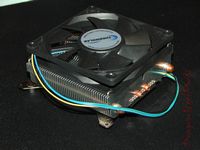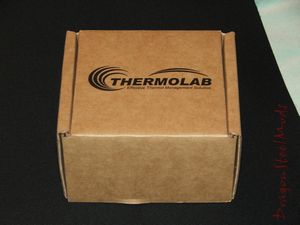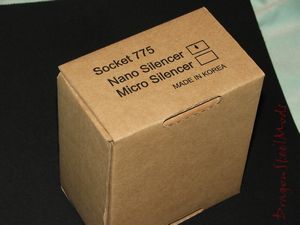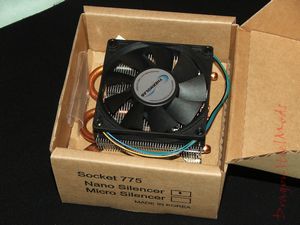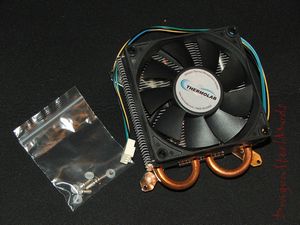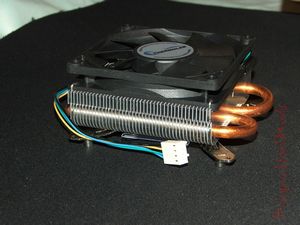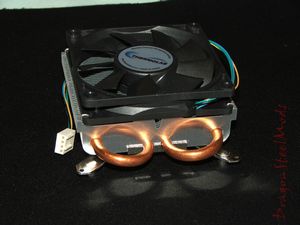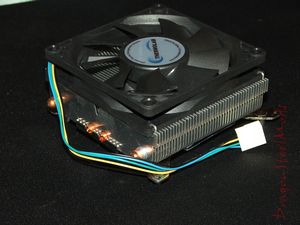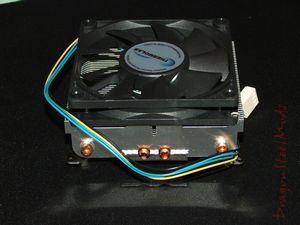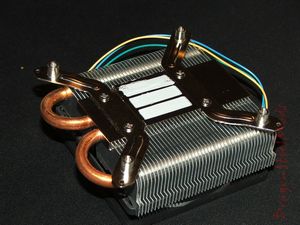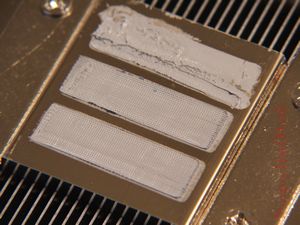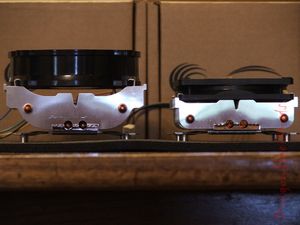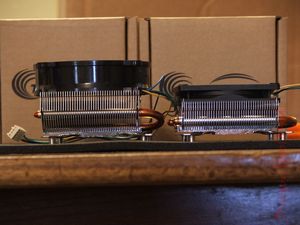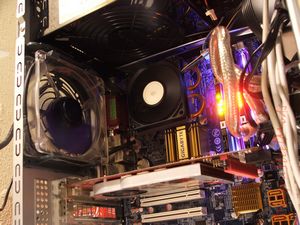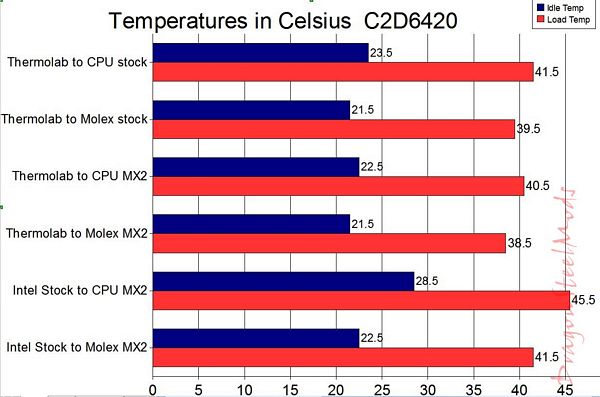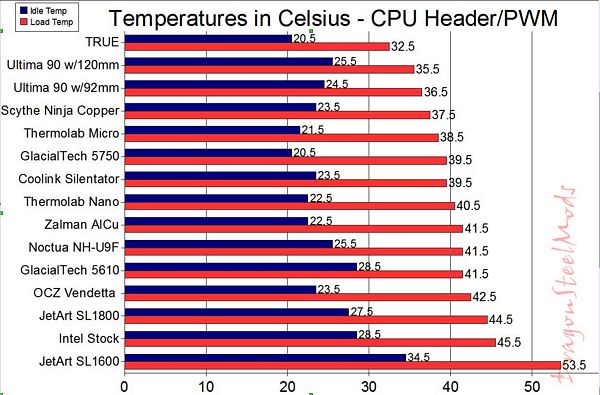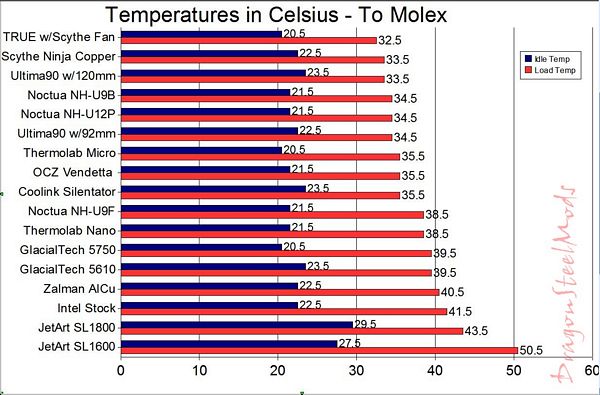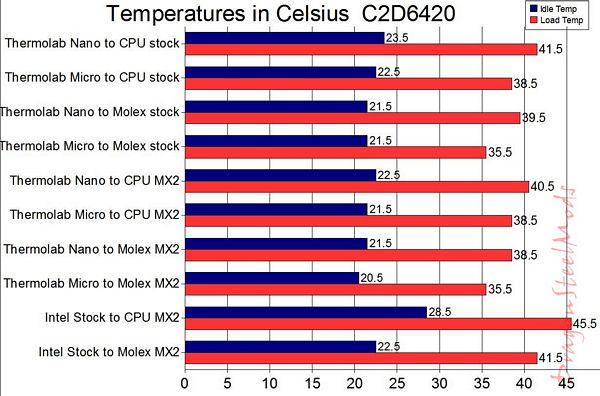Yesterday I looked at the Thermolab Micro Silencer CPU Cooler, today I've got the Thermolab Nano Silencer. If you thought the Micro Silencer was small then you'll be amazed at the size of the Nano Silencer, it is about half the size of the Micro and still performs almost as well. I'm truly surprised by the performance of this cooler when you consider just how small it is. Since it's so small there should be no problem fitting it into any size case, and there should be no compatibility issues with motherboards either.
So continue on to see a very small CPU cooler that performs just as good, and better than coolers that are twice or three times its size…
Thermolab Nano Silencer CPU Cooler LGA775
Author: Kristofer Brozio
Sponsor: Thermolab
Tech Specs,Features or the Basic Info:
Thermolab Nano Silencer CPU Cooler
PCT (Power Clamping Technology)
* Minimization
* Low noise
* Thermal stability
Design compatibility
* Mini-ITX, Micro ATX form factor
* Low Profile (LP) case
* Compatible with Pannel Pc, Tunning Pc, Car PC
Stable structure
* Stable mounting method
* Light weight
* Only for Intel Socket 775
Features
1. Application of Power Clamping Technology (PCT)
1) "Power Clamping Technology" is a new technology developed by ThermoLab that makes base block, heat pipe and
aluminum fins to strongly combine thermally by aligning heat pipe and fins after making minute size groove in the
base block then combining through tens of tons of power.
2) By applying Power Clamping Technology, "Nano silencer" not just makes lower noise and miniaturization
possible, but also maximizes CPU stability.
3) Through effective integration of PCT (Power Clamping Technology) and Sintered Powder Heat Pipe, difference in
performance resulted by installation direction, which is the weakest point of the heat pipe cooler, doesn't
occur.
2. Design compatibility
1)Compact Size
"Nano silencer" performs its best on Mini ITX motherboards as well as Micro ATX standards.
It shows excellent compatibility in slim cases and low profile cases with limited space.
2)Low noise
Heat sink of "Nano silencer" has an excellent cooling performance, and makes low noise by applying PWM Control
fan.
Applicable CPU
* Socket Standards : Intel Socket 775
* Thermal Design Power of CPU : below 100Watt
* Motherboard Standards : Mini ITX, Micro ATX, ATX
Specs:
Product Name: Nano Silencer
Dimension: 99.5 x 88.2 x 39 (L x W x H)mm
Weight: 214g (Heat sink and Fan)
Heatsink Material:
Pure copper (Heat Pipe),
Aluminum(Base Block, Fins)
Dissipation Area: 1,250 cm²
Fan
Dimension: 80 x 80 x 15mm
Speed: Less than 3,000rpm ± 10%
Noise Level(1): 30.5dB(A) at 3,000rpm
Bearing Type: Rifle Bearing
Control Method: PWM, Auto Restart,Locked Current protection
Fan Life Expectancy:
70,000hr continuous at 40°C ,
15~65% relative humidity
TIM(Thermal Interface Material)
Thermal Conductivity: 8 W/mK (ASTM D 5470)
Viscosity: 190 Pa·s
Density: 2.6 g/cm³
Color: Gray
A Better Look at Things
:
The packaging for the Thermolab Nano Silencer is the exact same as for the Micro Silencer, just a different box is checked on the side.
Inside we find the very small Nano Silencer CPU Cooler, a bag of screws and plastic washers and the instruction manual… (I just realized it's not in the picture, but it's there, just off to the side..oops)
The Nano Silencer is very well made, its solid and sturdy just like the Micro Silencer. It had two 'U' shaped heatpipes going through the fins to further help cooling with a thin style 80mm fan on the top. The fan blows downwards and thus helps to also cool components close to the CPU socket as well.
The Nano Silencer comes with Thermal Compound pre-applied, and the mounting system attached already, the Nano Silencer is for LGA775 only. The base seems to be flat and finished well, there are faint machining lines int eh base but nothing too bad.
You can see from the pictures the pre-applied thermal compound got smeared a bit, not a big deal though, it happened during shipping.
Installation, Testing and Comparison
Before we get into testing etc, here's a couple pictures of the Thermolab Micro and Nano Silencer CPU Coolers next to each other. There is a big difference in the size, but as you'll find out not much of a difference in the performance, the entire Nano is about the size of just the Micro Silencers' actual heatsink:
Setup is exactly the same as for my testing with the Thermolab Micro Silencer CPU Cooler, using a C2D6420 CPU and Gigabyte Micro-ATX Motherboard. Installation is fairly easy, though you will have to take the motherboard out of the case to do it, but in the end it is worth the effort because the mounting system is secure and stable.
But I did not run into the problem I did with the Micro Silencer hitting the Northbridge heatsink, the Nano Silencer is smaller in both height and width than the Micro Silencer, so there should be no compatibility issues at all with the Nano Silencer, but of course that depends on the size of your Northbridge heatsink…
Ambient temperature during all testing was 19C (+/- .3C)
I used Orthos Stress Prime to get load on the CPU, and averaged the results to get the temperatures you see in the charts below.
First up we have testing with the Nano Silencer, the testing is the same as that for the Micro Silencer. First up is temps for using the pre-applied thermal compound, and then using MX-2 thermal compound with comparison to the Intel Stock Cooler.
As we can see it beats the Intel Stock Cooler, but not by much, still though its smaller and quieter than the Intel cooler, so that's big bonus there.
Next up we've got full comparison charts, first is with the Nano Silencer connected to the CPU Header:
here we can see the Nano Silencer beats other coolers out there that are much larger than itself, considering its size, it has very good performance and it's virtually silent when running.
Next up we have the same set of coolers, but this time connected to the Molex, or with their fans running at full speed.
Here again we see excellent performance from such a small CPU cooler, I'm very surprised by the numbers gotten from this cooler. With the fan running at full speed it's audible but not overly so, the noise level should not bother most people.
Finally let's compare both the Nano and the Micro Silencer CPU Coolers together:
Obviously the Micro Silencer has better temperatures as it is a larger cooler, but still the performance of this little cooler is very good. I just threw this chart in for the fun of it, not really informative but I thought it would give a nice comparison of the two coolers…
Summary:
The performance of this cooler is amazing when you consider its size, this thing is small, but yet performs like a cooler two, three times its size.
With the Thermolab Nano Silencer CPU Cooler you'll have no problem getting it into any size case and most likely it will fit on any motherboard. The Gigabyte motherboard I use for testing has a large Northbridge Heatsink that has caused problems with several CPU coolers I've received for review, but the Nano Silencer fit fine with no clearance issues at all.
I'm truly impressed by the performance of both of these Thermolab coolers that I got for review, if these little coolers can perform this well then I can't wait to see what kind of temps that their tower style cooler will get when it is released 4th quarter of this year…
DragonSteelMods gives the Thermolab Nano Silencer a 4.5 out of 5 score and our Recommended Award as well.


Pros:
-Small and compact
-Well made
-Quiet when connected to CPU header
-Good performance for size
-Solid mounting system
-Easy installation
Cons:
-Might be incompatible with some motherboards with large style Northbridge heatsinks
-Audible when fan running at full speed
I would like to thank Thermolab for the chance to review the Nano Silencer CPU Cooler and for their continued support of DSM.
review# 425

